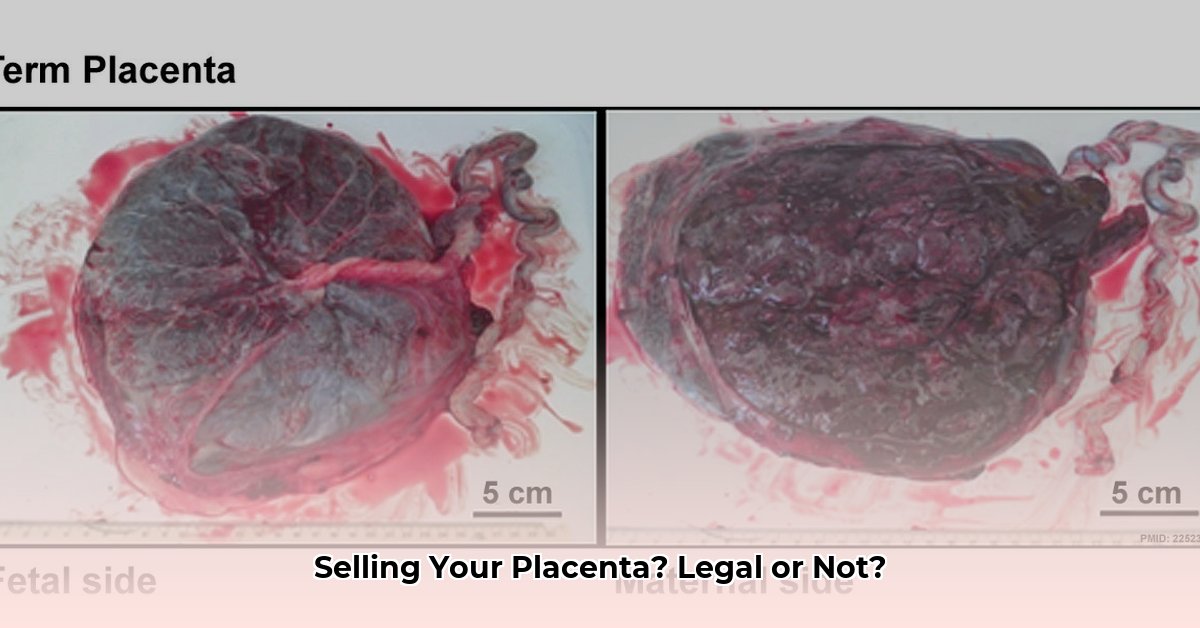The Quick Answer: No.
Selling your placenta is illegal in the U.S. The Food and Drug Administration (FDA) regulates human tissues, including placentas, under 21 CFR Part 1271. These regulations effectively prohibit the sale of placentas.
Why Selling Your Placenta Is Illegal
The FDA’s regulations stem from several crucial considerations:
-
Public Health and Safety: Mishandling placentas can pose significant health risks, including bacterial contamination and infection. Regulations ensure the safe handling and disposal of this biological material.
-
Ethical Concerns: Commodifying human tissue raises ethical questions about exploitation and equitable access to healthcare. The regulations prevent a market where vulnerable individuals might feel pressured to sell their placentas for financial gain.
-
Preventing a Black Market: Allowing the sale of placentas could create a black market, bypassing safety regulations and potentially leading to health risks and exploitation. The current laws help prevent such a scenario.
Debunking the Myth of Placenta Profits
While placentas are valuable for medical research and some therapies, this doesn’t translate into a legal market for individuals. Rumors of high-value placenta sales are simply untrue. The FDA regulations prevent the commercialization of placentas, regardless of any purported benefits.
Safe and Legal Options for Your Placenta
You have several safe and legal options for managing your placenta after birth:
1. Placenta Encapsulation
This involves processing the placenta into a powder form and encapsulating it for ingestion.
- Process: A trained and certified specialist dehydrates, grinds, and encapsulates the placenta following strict hygiene protocols.
- Claimed Benefits: Some believe it may help with postpartum recovery, but scientific evidence supporting these claims is limited.
- Safety Concerns: There are potential risks, including infection, if not handled properly. The CDC advises caution. Consult your doctor or midwife before considering this option.
- Finding a Provider: If you choose this route, ensure your chosen provider is certified and adheres to strict safety standards.
2. Placenta Donation
You can donate your placenta to medical research, contributing to scientific advancements and potentially helping others.
- How to Donate: Contact research institutions or hospitals to inquire about their donation programs and requirements.
- Benefits of Donation: Your donation can support vital research in areas like pregnancy complications and the development of new therapies.
3. Cord Blood Banking
While not directly related to the placenta, cord blood banking is another option to consider. It involves collecting and storing the blood from your baby’s umbilical cord, which is rich in stem cells.
- Potential Benefits: These stem cells can be used to treat certain diseases.
- How it Works: Contact a cord blood bank before delivery. They’ll provide a collection kit, and your healthcare provider will collect the blood after birth.
Frequently Asked Questions
- Is it safe to eat my placenta? The safety is not definitively established. Scientific evidence is limited, and the CDC advises caution due to potential infection risks. Always consult your doctor.
- Will eating my placenta offer any benefits? While some people believe it offers benefits like improved mood or increased milk production, scientific research hasn’t consistently confirmed these claims.
- Do state laws impact my options? While selling is illegal everywhere in the U.S., state laws may have specific regulations about handling and disposal. Check with your hospital or birthing center.
Ethical Considerations
The concept of selling human tissue, including placentas, raises complex ethical questions. Commodification of the human body is a sensitive topic with diverse perspectives.
The Future of Placenta Regulations
As research advances and societal views evolve, regulations surrounding placenta practices could change. Staying informed about potential updates is essential.
Disclaimer
This information is for educational purposes only and does not constitute legal or medical advice. Consult with qualified professionals for advice tailored to your situation. Always discuss your options with your doctor or midwife to make informed decisions about your postpartum care.
- Top Rated Meditation Books to Deepen Your Practice - February 5, 2026
- Good Mindfulness Books For A Calmer, Happier Everyday Life - February 4, 2026
- Recommended Meditation Books for Beginners and Experienced Practitioners - February 3, 2026
















